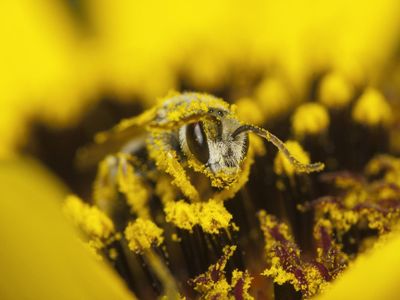What is Pollen?
Pollen is a small grain made up of just a few cells and is produced by both flowering plants and cone-bearing plants, known as angiosperms and gymnosperms. If you are allergic, you feel the presence of pollen in the spring. If not, you likely notice it dusting surfaces, often giving things, like your car, a greenish tinge. Pollen grains are unique to the plants they come from and can be identified under a microscope by shape, size, and the presence of surface textures.
Why Do Plants Produce Pollen?
In order to reproduce, plants need to be pollinated, and this is the reason that they produce pollen. Without pollination, plants will not produce seeds or fruit, and the next generation of plants. For us humans, pollination is so important because it is how food is produced. Without it, our plants wouldn’t make the produce that we eat.
How Does Pollination Work?
Pollination is the process of moving the pollen from the male components of a plant or flower to the female parts. This fertilizes the female reproductive cells so that a fruit or seeds will develop. Pollen is produced in flowers in the stamens and then must be transferred to the pistil, the female reproductive organ. Pollination may occur within the same flower, which is called self-pollination. Cross-pollination, from one flower to another, is better and produces stronger plants, but it is more difficult. Plants have to rely on wind and animals to transfer pollen from one to another. Animals like bees and hummingbirds that make this transfer, are called pollinators.
Pollen in the Garden and Allergies
If you are a gardener and a pollen allergy sufferer, you really pay the price for your hobby in the spring. Pollen and pollination are essential, so you want to encourage it, yet you want to avoid allergy symptoms. Stay inside on high-pollen days and days that are windy in the spring and use a paper mask when in the garden. Put your hair up and under a hat, as pollen can get trapped in it and come in the house with you. It’s also important to change your clothes after gardening to stop pollen from coming inside.
